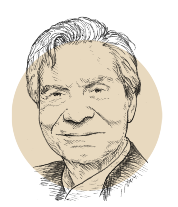France-Amérique: The French are worried about Donald Trump winning a second term and they don’t understand what makes him so popular. Could you shed some light on the question?
Gérard Araud: First of all, we need to understand why Trump is currently the leading Republican candidate and ahead in the polls. The simple answer is that his voters don’t judge him by the same criteria as the French do. In fact, they have rather positive memories of his first term; the economy was in good health and, above all, there was no inflation – unlike today. Gas was cheaper, which is decisive in voter attitudes towards the government, even when the state has nothing to do with it. Trump’s supporters liked – and still like – his bad temper, his hostility towards the establishment, and his unpredictable nature. They see him as a strongman who defends the interests of the average American. Trump’s hostility to the woke movement, and feminism in particular, is also in keeping with the deep-seated resentment of a predominantly White swath of America. And he enjoys massive support from evangelicals, simply because he is hostile – or claims to be hostile – to abortion. For these religious groups, this is a decisive position.
Are Trump voters swayed by his foreign policy track record, or by his potential actions in this area if he returned to power?
What Trump’s past and future voters see is that he has not engaged in any conflicts, unlike his predecessors and his successor. They believe, rightly or wrongly, that because Trump is intimidating, he has ushered in an era of peace thanks to his imposing personality. Of course, this is impossible to prove.
What might Trump’s foreign policy towards Europe look like if he were re-elected?
I see the Trump of today as different from the Trump of yesterday. He has become more radical. As a result, if he were to return, he would be even more isolationist than during his first term, both militarily and economically. Europe has no place in Trump’s vision. He doesn’t know it and, for him, it doesn’t exist. He doesn’t understand why America is so committed to defending Europe, or why NATO is essentially reliant on the U.S. military. He believes that it is up to Europeans to defend themselves, without the support of the United States.
What would this mean for Ukraine?
We can already see a gradual withdrawal from Ukraine by Joe Biden’s administration and Congress, coupled with a growing weariness in American public opinion. Are U.S. interests really under threat in Ukraine? Most Americans don’t think so, and for Trump, the answer is a resounding “no.” He is actually personally hostile to Ukraine and its president, as he was investigated for (unproven) financial dealings with Ukraine during his first term in office.

Could Europe take over from America in Ukraine?
Europe in general, and France in particular, are preparing for America to withdraw, and are stepping up military support for Ukraine as a result. But I don’t think that Europe has the means to succeed. Europe’s arms industry is not capable of taking over from the United States in the short term. It would take several years, and I doubt that Ukraine can wait that long…
Trump’s reelection would therefore play right into Russia’s hands?
Probably, yes. Trump has a certain appreciation for Putin. America’s withdrawal and isolationism would give Russia free rein – a worrying prospect for neighboring countries such as the Baltic states and Poland, which would be unable to defend themselves against Russian attacks even with support from other European countries. I would like to emphasize that this withdrawal from Europe cannot be attributed solely to Donald Trump. It began under Barack Obama, when he pivoted U.S. foreign policy towards Asia. The former president considered that future stakes would play out in the Pacific, and that any threats would come from China rather than Russia. Obama, Trump, and Biden have all contributed to this withdrawal from Europe and shift towards Asia.
How should Europeans prepare for a possible second term under Trump?
Trump or not, Europe is not ready to defend itself alone. In fact, most European leaders don’t even want to. If Trump were to return to power and threaten to leave NATO, we would see European leaders, particularly in Eastern Europe, rushing to Washington D.C. pell-mell to negotiate special agreements. The French government has been the only one, for a very long time, since General de Gaulle at least, to consider a strictly European defense. But we have no significant support to achieve this goal.
Can we envisage some in France rejoicing if Trump wins?
Yes, of course. Trump has supporters in France, particularly on the far right, which defends the same nationalist values and hostility to wokeness and the European Union.
Interview published in the March 2024 issue of France-Amérique.












